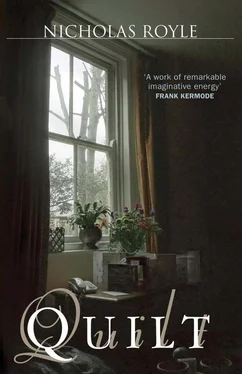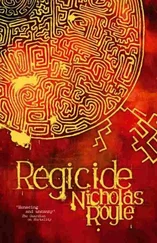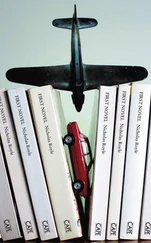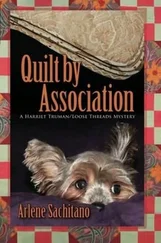Nicholas Royle - Quilt
Здесь есть возможность читать онлайн «Nicholas Royle - Quilt» весь текст электронной книги совершенно бесплатно (целиком полную версию без сокращений). В некоторых случаях можно слушать аудио, скачать через торрент в формате fb2 и присутствует краткое содержание. Год выпуска: 2011, Издательство: Myriad Editions, Жанр: Современная проза, на английском языке. Описание произведения, (предисловие) а так же отзывы посетителей доступны на портале библиотеки ЛибКат.
- Название:Quilt
- Автор:
- Издательство:Myriad Editions
- Жанр:
- Год:2011
- ISBN:нет данных
- Рейтинг книги:4 / 5. Голосов: 1
-
Избранное:Добавить в избранное
- Отзывы:
-
Ваша оценка:
- 80
- 1
- 2
- 3
- 4
- 5
Quilt: краткое содержание, описание и аннотация
Предлагаем к чтению аннотацию, описание, краткое содержание или предисловие (зависит от того, что написал сам автор книги «Quilt»). Если вы не нашли необходимую информацию о книге — напишите в комментариях, мы постараемся отыскать её.
Quilt — читать онлайн бесплатно полную книгу (весь текст) целиком
Ниже представлен текст книги, разбитый по страницам. Система сохранения места последней прочитанной страницы, позволяет с удобством читать онлайн бесплатно книгу «Quilt», без необходимости каждый раз заново искать на чём Вы остановились. Поставьте закладку, и сможете в любой момент перейти на страницу, на которой закончили чтение.
Интервал:
Закладка:
He calls it the one-off episode, like it was a special edition of a TV show. He assures me he will go. And then for three days I hear nothing. Three oceans. He doesn’t answer the phone, he doesn’t respond to emails. I send half a dozen text messages imploring him to let me know he is OK. On the fourth day he picks up the phone and sounds normal. He asks how I am, apologises for not being in touch earlier, he’s been out a lot, tootling about in the motor, he says, picking up supplies for the rays.
— I’m onto a new project, he says.
— What about the doctor?
Silence. Then in a dipped voice:
— You’ll be just like the rest of them. You’ll think it absurd. I have a new theory of ghosts. It’s been staring me in the face.
His voice sounds strained. I try to reassure him:
— Of course not. I’m listening, my love.
Then he pitches off again:
— I was down at the Tea Party… Oh!
— Whatever’s the matter?
— Oh, my god! It’s happening again!
— What are you saying?
— It’s the rays. I noticed it last time we talked and now it’s happening again. I was just feeding them some bits and pieces of left-over salad from the fridge. They were tranquilly engaged with that, chomping away, then when the phone rang…
— Yes, when the phone rang?
— It’s as if your voice, that pristine chapel, held in place, hello?
Another silence.
— Are you there?
— It’s like a choreography written in water. When you speak they raise themselves up, as if braced by something deep inside your voice. They were busy at the lettuce but the moment I say ‘Tea Party’ they all break off, and when you go ‘Whatever’s the matter?’ perk up their noses and pulse upwardly through the silvery light of the pool, in a shimmy of adoration. They miss you.
I laugh, a bit apprehensive, unsure how much of this is his English sense of humour.
— I miss them . You were at the Tea Party…
— …having a coffee and veering about on the net, I came across all these images of rays, you have to see them. They’re stunning. But then there’s something that’s terrible. It sickens me. It’s from somewhere, some hunting grounds I want to say, off the coast of your country. I don’t want you to see this. It’s like the forbidden photograph in Barthes, the most important one, he doesn’t reproduce. It’s almost a hundred years ago and there’s this moustache-twirly sea captain standing in front of a dead ray that’s been yanked up on a crane, perhaps an old fire-engine winch. It’s a manta. A ‘giant devil fish’, as the silly caption exclaims. It measures seven metres across and weighs eight tons. For me, it’s a photograph of photography. It’s a puncturation of the punctum. It’s a riddle, a true riddling: a punctum everywhere you look. It’s the astonishing, majestic corpse of a manta, bigger than any living creature. It fills the frame and it’s full of bullets: it seems the creature caught its hunters rather than vice versa. It comes with strings attached.
— Strings attached?
— Strings, lines, ropes, yes: it got caught up in fishing lines and the noble captain and his trigger-merry men had to shoot it twenty or thirty times to be confident it was dead, but it’s a picture that shows you the ropes, the way everything is rigged. The colossal creature is strung up: the iconography of a lynching is unmistakable. And the captain is standing proprietorially alongside, pointing with his right forefinger, in case you might otherwise not notice the — I was going to say, elephant in the room. Like a tenting to the quick, now dead, his digit is itself a wound. Ecce Manta birostris . Another wound, but not the last. And can you guess what he’s holding in his other hand?
— His gun? A cigar?
— At first glance it looks like a paper plane. But it’s a baby manta, rigid, barely ten inches across, stillborn, proudly extracted from the mother at the creation of the massacre. And then the eye…
— I, ego?
— No, this isn’t about the ego. The eye of the photograph. It’s a way aloft, unnoticed at first amid the ropes and crane, against the tall deadwall blankness of brickwork that forms the backdrop to the whole picture. Only one is visible, but it’s the mother’s eye, and it’s looking at you, just as though it were alive.
— Sounds terrible. It reminds me of something I was reading recently about hypnosis. Just as you can never be sure someone under hypnosis isn’t merely pretending to be, so a dead eye in a photo might be a trompe l’œil too. I’m sorry. But I was asking you about the doctor…
— No, my dearest, I’m telling you about the new project.
— But I’m asking you about the doctor…
— You wouldn’t believe what I’ve managed to do here. I’ve been working at it day and night. It’s a new pool.
— What do you mean, a new pool?
— Well, not ‘pool’ exactly. More like ‘donut’. Ah! They’re doing it again! Incredible! When you said you were asking me about the doctor, when you put the stress on ‘you’, they started choreographing you again. Hilary gave this sort of twitch of grace and went sliding, jetting up the side of the glass, coming to rest virtually on my face here, while Taylor took to shuffling in the substrate. They’re directly responding to you. If you were here you’d understand. When are you going to be here?
— You know this, I told you: I can’t get across for another month. Donut?
— Remember last summer? The marvellous donut-shaped rays’ enclosure at the aquarium in Barcelona? And then when we got to the place in Boulogne — what’s its name?
— Nausicaa.
— The very same. You remember the eagle rays at Nausicaa?
— Don’t tell me. You’re building a donut-shaped pool for eagle rays in the drawing room.
— How did you guess?
— Could it be because last time you deigned to talk to me you were telling me all about how you had got the estate agent in and how you’re putting the house on the market and now you’ve come to the realisation that the property will be much more attractive, especially to families, if most of the ground-floor accommodation is taken up with touchpools for rays?
‘Touchpools’ is a mistake. Creepy, it’s as if I’m losing touch with him .
— Touchpools ?
Exasperated and uneasy, I am starting to apologise, but he cuts me off:
— I changed my mind. I realised it couldn’t be done. I’m keeping the house.
I’m inclined to query this (how can he afford it? what about his job?), but he’s irrepressible now:
— You want to know about the doctor? Exactly. Everything’s fine. My brain’s entirely normal: that was their actual phrase. I signed up in town as a temporary resident and saw the doctor and he set up a hospital appointment for me the very next day. It was like being in a very slow washing-machine. And then the letter came through from the consultant just yesterday. I’m all clear. I’m entirely normal ! But here’s the thing. And it has to do with the photograph I was telling you about. It’s about ghosts and nakedness and superimposition. When I signed on at the local surgery I’d expected to see the GP who saw my father, but actually it was the old one, the other one, the doctor who used to be our family doctor, twenty years ago. Dr Scrivens is his name. He’s always given me the creeps. My mother couldn’t tolerate the thought of him and when she began to decline, through the disintegration of days and years following the point at which as she told me she was losing her marbles, she connected keeping her health with not seeing this doctor, and then the question came up of her seeing him. It would have been a sort of declaration that she was certifiably off her rocker. The whole prospect terrorised her. It delayed for weeks the very idea of getting her seen by anyone at all. In the end my father managed to get her transferred to another doctor. But then on some later occasion, to do with a graze on her leg that would not heal, my father took her along, sitting with her in the waiting room before guiding her through the door when called, virtually into the arms of Scrivens. Floating face-up in Alzheimer soup was she by then merely oblivious? Or did seeing this object of terror somehow return her to life, in the way that sometimes a tiny incident or chance encounter can trigger a massive recuperation, if only for a moment? All of this only comes back to me now when I find myself in the same trap. I am at the surgery and before I realise what’s happening there I am, just six feet away from him, and of course he has been expecting me, he’s had time to prepare, but our encounter is the strangest phantasmagory, his eyes shifting eerily into focus like binoculars on a death-camp. Naturally he smiles, and I too. It is Scrivens, unmistakably, twenty years later yet miraculously aged, as if from a fairytale. And perhaps he, almost completely gray-haired, fainter-eyed, experiences from head to toe the passage of a similarly wayward vibration: I will look twenty years older to him too. And any second, I know, because now it comes back to me, he’ll do that thing with his eyes, that ocular passover, coming out with the standard portrait, the medical gaze that all doctors are trained to impose. But for that crystalline split-second slice of replay, in which we set eyes upon the other, I’m seeing Scrivens in my mind’s eye seeing me, double strangers both, outstaring ghosts. That’s when I have this eureka thing, and I realise my theory.
Читать дальшеИнтервал:
Закладка:
Похожие книги на «Quilt»
Представляем Вашему вниманию похожие книги на «Quilt» списком для выбора. Мы отобрали схожую по названию и смыслу литературу в надежде предоставить читателям больше вариантов отыскать новые, интересные, ещё непрочитанные произведения.
Обсуждение, отзывы о книге «Quilt» и просто собственные мнения читателей. Оставьте ваши комментарии, напишите, что Вы думаете о произведении, его смысле или главных героях. Укажите что конкретно понравилось, а что нет, и почему Вы так считаете.












